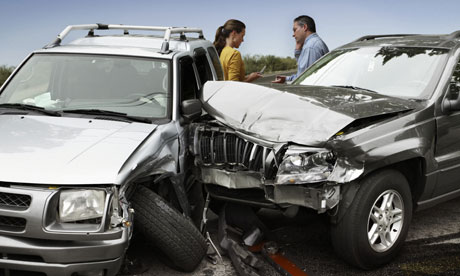Bad Words
The old adage “think before you speak” is doubly true when making an insurance claim. Saying the wrong words to your company can turn even what should be the most painless of settlements into a sticky situation. Adjusters are trained to regard specific “trigger” words in a claimant’s report as indicators that (s)he does not have a legitimate claim.
Here’s the golden rule of claims reporting: never say more than absolutely necessary. The more you talk, the higher the chance that you’ll trigger a red flag for the adjuster handling your claim. Explain exactly what happened, and avoid the following words in your explanation to both law enforcement on the scene and your insurance company:
1. Sorry
Many people make it a habit to apologize when an accident occurs–whether or not they are at fault (I know I have a tendency to apologize when someone bumps into me!). No matter the circumstances, the words “I’m sorry” are as good as a confession to police officers and insurance adjusters. Avoid confusion about your role in the accident, especially when it wasn’t your fault.

Image courtesy of theguardian.com
2. Whiplash
Whiplash claims are the nemeses of insurance companies, which are vigilant about identifying fake medical claims. Don’t self-diagnose–if you suspect trauma, see a doctor as soon as possible and get a medical report.
3. Intentional
Your insurance policy will protect you against bad luck and bad judgement, but for intentional acts, you’re on your own. If you broke your car window in order to get your keys, be prepared to pay the damage out of pocket.
4. Customized
Insurers are not interested in covering drivers with souped-up cars that have lots of special features. Customizing and/or upgrading your car may mean it will only be covered by insurance up to $2000, and some modifications can void your policy altogether.
5. Breakdown
If your car won’t start in the morning or your axle snaps while you’re turning a corner, you don’t have an insurance claim–you have a mechanical failure. Breakdowns are not covered by auto insurance unless specifically added to your policy. If you do purchase breakdown coverage, make sure you understand exactly what it covers and for how much.
6. Fine
Many accident victims have an instinctual tendency to assure bystanders that they are fine, even if they barely survive a wreck. Let your doctor determine if your fine before you tell anyone else that you are, including your insurer.
7. Ride-share
Ride-sharing services like Uber are commonplace nowadays, especially in urban areas, but if your car is used for a purpose other than that for which the policy is issued–for example, if your vehicle is insured for commute purposes but you use it for commercial purposes–you likely won’t be covered. Renting out your car as a taxi service could even void your coverage, so don’t turn your car into a side business without consulting your agent.

Image courtesy of abovethecrowd.com
8. Off-premises
The phrase “off-premises” may indicate to your insurer that your problem isn’t covered by your policy. One man told his insurer that water damage to his home might have been caused by an outside sewer rather than a problem on his property, and his claim was ultimately denied.
9. Coincidence
Insurance companies tend to be suspicious of people who insist that an unusual situation was just a coincidence. Insurance fraud is a serious concern for insurance companies, so make sure your account sounds possible.
Need help with a claim? Call Agency by the Mall and one of our agents would be happy to assist you!



